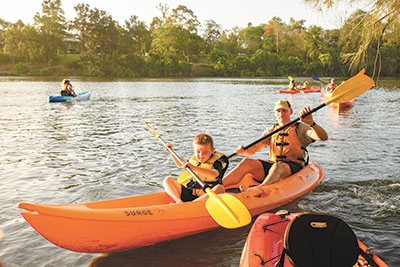Penrith City Council, New South Wales (NSW), has developed the Recreational Water Monitoring Program to inform the community when it is unsafe to swim locally.
With improvements to the river precinct planned under the Our River Masterplan, knowing the water is safe for swimming is increasingly important.
Penrith Mayor, Ross Fowler OAM, said the health of the local community and of local waterways including the Nepean River is important to Council.
“Ideally what we want to achieve is a grading system for the Nepean River similar to the NSW Beachwatch beach grading system.
“Our program aims to provide the community with accurate information on the cleanliness of the water so individuals can make informed decisions about the risks associated with water based recreation.”
Stormwater flows untreated from our City’s drains to our creeks and rivers, and can carry chemicals, minerals, and nutrients into the water causing significant difference in water quality before and after rain.
Council’s Recreational Water Monitoring Program includes weekly bacteria (enterococci) testing in the warmer months. Results are assessed applying National Health and Medical Research Council Guidelines to provide a guide on the suitability of sites for swimming.
Council officers also completed a sanitary survey in accordance with the national guidelines to assign a ‘sanitary inspection category.’ This involved identifying all sources of potential contamination that might affect the water quality, such as stormwater drains, native animals, sewage leaks from Sydney Water’s infrastructure network, local Sewage Treatment Plants, septic tanks and boating activities.
The results from the sampling combined with the sanitary inspection category allow Council to assign a ‘river grade’ and provide residents with better information on the public health risk posed to water users.
A minimum of 100 samples need to be taken before the data is considered reliable, but the results from the last two and a half years suggest that water quality at these sites is generally good, except immediately after rain. Once 100 samples are tested, Council’s website will be updated to include a section on Recreational Water Quality.

















